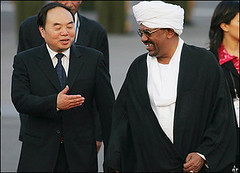
Sudanese President Omar al-Bashir Being Greeted By Chinese Official After Arriving in Beijing for the Sino-African Summit
Originally uploaded by Pan-African News Wire Photo File
By Louis Charbonneau
November 12, 2010
UNITED NATIONS (Reuters) - After weeks of delays due to Chinese objections, the U.N. Security Council on Friday received a report on violations of the arms embargo in Sudan's western Darfur region that infuriated Beijing.
Austrian U.N. Ambassador Thomas Mayr-Harting told reporters he was passing the so-called Panel of Experts' report on compliance with the embargo to council members. A council diplomat later confirmed that the report had been sent out.
The confidential report, which Reuters has seen, said Khartoum committed multiple breaches of the embargo and China has done little to ensure its weaponry is not used in Darfur.
It describes how markings on most of the 18 types of bullet casings found at scenes of attacks against U.N./African Union peacekeepers indicated they were manufactured in China. But it did not say the Chinese government was necessarily to blame.
China had reacted angrily to the report and refused to allow the Security Council's Sudan sanctions committee to formally pass it to council members so that they could consider taking action, envoys said. Sanctions committees work on the basis of consensus, which means each member has veto powers.
As a result, it sat in limbo on the committee for weeks before Mayr-Harting passed it to the 15-nation council.
Normally such reports are published on the website of the Sudan sanctions committee, which Mayr-Harting chairs. It is unclear whether the experts' report will be made public.
Mayr-Harting said council members would have to decide whether or not to publish the report. Diplomats say China would prefer to keep it out of the public eye.
CHINESE CONFIDENCE
The Chinese delegation has publicly complained about the report, saying it had "serious concerns" about it.
China blocked a similar report by a panel of experts on North Korea sanctions for six months before allowing it to reach council members earlier this week.
The attempt to prevent the reports' transfer to the Security Council and release to the public, envoys said, was emblematic of China's increasingly self-confident approach to international diplomacy as it seeks to protect states like North Korea and Sudan to which it has close ties.
It is not illegal to supply weapons to Khartoum, but states are required to have so-called "end-use" guarantees from the Sudanese government that the arms will not end up in Darfur. But many weapons and much ammunition reaches Darfur regardless of such guarantees, the experts' report says.
For this reason, the expert panel recommends expanding the 2005 arms embargo to include Khartoum, but diplomats say China would most likely use its veto power to block any such move.
The conflict in Darfur flared in 2003 when mostly non-Arab rebels took up arms against the government, accusing it of neglecting the region. Khartoum fought back, and the United Nations estimates up to 300,000 people died in the ensuing humanitarian crisis. Khartoum puts the death toll at 10,000.
(Editing by Stacey Joyce)
No comments:
Post a Comment